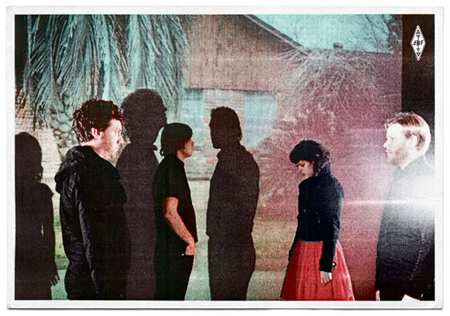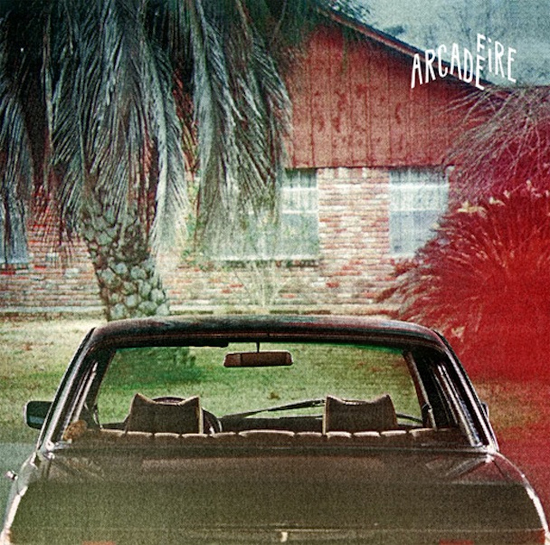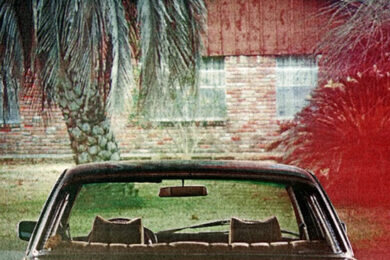‘The Suburbs’
The Arcade Fire slipped back into the room in May almost unnoticed, like a Hitchcockian auto-cameo. Their desire to have their 12" distributed by independent record shops alone has meant that there has been a refreshing lack of coverage in the press, and little hype one way or the other. Now, it’s just days before The Suburbs, their third album, is released. The choice of this track (backed with ‘Month Of May’) for the 12" was a purposeful statement of understatement in itself, given that neither track is particularly outstanding by the standards of the The Suburbs as a whole. However, this song does set the tone aesthetically for the rest of the album, in the unfolding drama of the Arcade Fire as a group sensibility. This is a gradual gradient of maturity from Funeral (people die) to Neon Bible (EVERYONE DIES!) to The Suburbs (but, y’know, it’s not going to happen today so just chill out). The progression is similar to the one William Blake takes us through in Songs Of Innocence And Experience that suggests forward momentum and maturity. Something backed up by Win Butler’s falsetto assertion: "Sometimes I can’t believe it, I’m moving past the feeling", which also loosely mirrors the trajectory through the various stages of bereavement or heartbreak.
‘Ready To Start’
If one thing is immediately clear about the septet from Montreal, Quebec, Canada, it is that they have never sounded so current. And while this is perhaps not that surprising for a band whose first album traded in post punk, bossa nova and jazz and whose second leaned heavily on imperial period, American rock, most of this has been cast aside without losing anything core to their sound. Whether by accident or by design, ‘Ready To Start’ has fuzzy vocals, noisy, rushing guitars and banks of woozy synthesizer noise, lyrics that yearn for the safety of a warm feeling but half-forgotten childhood. This is stadium glo-fi. Markus Dravs has donned the producer’s mantle once again. He is a safe pair of hands and, after working with James, Coldplay and Eno’s Nerve Net, it’s obvious that he can be trusted to bring a certain sense of drama and opulence to a project, no matter what raw material he’s presented with. Luckily for us however, in the current ranking hierarchy of arena indie bands, Arcade Fire and Coldplay couldn’t be more different, Dravs’ weighty and portentous production is more suited to the former’s hefty punch than it is to the latter’s nebulous whinny.
‘Modern Man’
Think of Tom Petty And The Heartbreakers’ ‘Learning To Fly’… well, ‘Modern Man’ is the great follow-up single that never was. In the past this would have been a dead cert for a single, one can feel the ghostly presence of Roy Orbison stood at Win Butler’s shoulder, guiding him with easy grace and nodding approvingly. It is thankful to note that lessons have been learned from the overegged sonic pudding that was Neon Bible. The song breathes and stretches, all the more affecting for not struggling under layers of instrumentation. Instead it stands, barely clothed and beautiful…
‘Rococo’
…which is not to say that they don’t know how to lay it on amazingly when they need to. Beautiful arrangements were the calling card of Funeral, and so it is here. They move from a very ironic idea of Win being a "modern man" directly to a straight-faced hauteur when referring to the "modern kids" who are "using long words they don’t understand". He adds: "They seem so wild but they’re so tame." As if to re-enforce the idea, Regine repeats the refrain of "rococo" until its meaning breaks apart like pleasant but nonsensical baby babble. And all the while the glorious synthesis of music lies somewhere perfect between Spiritualized and ELO.

‘Empty Room’
This heart-palpitating flush of modern chamber pop fires up on a trill of violins at a lunatic pace, while Regine takes control. The pop orchestration swells and builds until it feels like it will sweep everything in its path away.
‘City With No Children’
As always, these epic albums (this one is a double by old standards, it has 16 tracks and lasts for over an hour) can be triggered by something very small. In this case Win was sent a photograph of an old school friend of him standing with his daughter sitting on his shoulders "at the mall around the corner from where we lived". He adds: "The combination of seeing this familiar place and seeing my friend with his child brought back a lot of feeling from that time. I found myself trying to remember the town that we grew up in and trying to retrace as much as I could remember." This triggered a Proustian avalanche of recall and led to this rumination on age and change, how children struggle for years to leave the suburbs for the city only to often welcome the return to the suburbs when the chance arises years later. And it is easy to see which stage of this journey Win is at: "I feel like I’ve been living in a city with no children." This is one of the few songs that could have sat easily on the last album, but is perhaps more reminiscent of Neil Young than Bruce Springsteen.
‘Half Light’
The suburbs that Win and bandmate brother William grew up in were those of Houston, Texas. And these, like all areas where city high density bleeds out into the surrounding countryside, can be magical places themselves. So in more concrete terms, if you drive down the freeways out of downtown Houston and walk the dusty avenues toward Neartown you might see the crucifix of St Thomas signifying your entry into the University district. At 1409 Sul Ros Street is a discrete modernist church, lacking in any discernible symbols of obvious denomination. Inside are hung triptychs of rectangular canvasses painted in arterial crimson and purple bruised black. The suburbs of Houston they may be, but they were also where Marc Rothko chose to make his last public stand and where non-figurative art has its most sombre celebration. By returning here, spiritually, Arcade Fire have regained the very thing that made them special in the first place. And musically they have gone back even further bringing in punch drunk, lovesick 1950s pop and romantic, string laden exotica. But mainly there is less detail, just deep rich colour.
‘Half Light II’
In a recent interview the band claimed that the album was going to be like a combination of Depeche Mode and Neil Young. (What? Have they never heard Trans?) And this is the first time this heady concept rears its odd-looking head. In theory, however, this really makes itself felt in a pulsing, 80s New Order, synth bassline. (The band are fans and often cover the Mancunian legends live.) This gives way to a temporary but effective scree of tumbling white noise and guitar feedback. There are overtones of U2 here but this is U2 at their imperial, Brian Eno-produced, A Sort Of Homecoming best.
‘Suburban War’
Again Tom Petty hoves into view, but otherwise there is acres of space that allows the undiluted songwriting skill to shine through. The idea of war in the suburbs is something teachers suggest when they want children to visualise the harsh realities of combat. Butler suggested recently that many of the lyrical conceits here were triggered by memories of a particularly inspirational teacher who was (apparently) a polyglot spy who taught him about TS Eliot. Here, as in one or two other places on The Suburbs there is a brief but gorgeous shimmer of reverb guitar that calls to mind the Stone Roses.

‘Month Of May’
The B-side to ‘The Suburbs’ 12". Again it feels more like a way of confounding expectation than part of the fabric of the album but nonetheless it’s great slab of unexpected and very polished punk rock, like ‘Faster’ in the middle of the Manic Street Preachers’ The Holy Bible. Here they take the clipped robot rock aesthetic of Queens Of The Stone Age on Songs For The Deaf and apply it to blistering Ramones song format.
‘Wasted Hours’
A bare bones ‘unplugged’ back porch number with quasi-doo wop backing vocals and cosmic Americana flourishes, as if David Crosby was being backed by Grandaddy. The title could be a joke (although, given the ‘seriousness’ of the band, it doesn’t seem too likely), in that it doesn’t sound at all like a lament about the protagonist’s youth that has drained away but the joyous memory of a lazy, carefree time drinking a beer or smoking weed in the sun. Wishful thinking this may be, but the band took their first break in four years at the end of 2008 before starting on this record and this has obviously paid dividends.
‘Deep Blue’
It is something indeed that, on first play through The Suburbs, it was wasn’t until ‘Deep Blue’ that I was confronted with what appears to be an unremarkable indie rock chugger. This of course may well bed in several listens down the line.
‘We Used To Wait’
Strangely but pleasantly this starts off like an awesome but long since forgotten Supertramp or 10cc song rather than Basildon’s most famous synth pop export, or Crazy Horse’s taskmaster. This of course, should it need to be mentioned, is a good thing. The plinking pianos and staccato new wave guitar riff provide the backdrop to Win’s lament about a specific instance of epistolatory laziness which he now rues. His teacher’s influence is heard in the lyrics again. "I’m gonna write a letter to my true love… like a patient on a table." He is utilising the same jarring imagery that opens Eliot’s masterful ‘The Love Song Of J. Alfred Prufrock’.
*‘Sprawl I’
A minor key piano lament to the lack of time left, this feels like a trip round an old neighbourhood, and the slowly-dawning realisation that the building one is looking for has long since been demolished. The hope of the day is then suddenly replaced by melancholy.
‘Sprawl II’
"Quit these pretentious things and just punch the clouds" sings Regine on what is probably the key lyric from this album. (Presuming that this is not some obscure threat to former string arranger and cloud-pooer Owen Pallett) An arpeggiating keyboard suggests the kind of synth revivalism that Thrill Jockey’s Lazer Crystals or Edition Mego’s Emeralds specialise in.
‘The Suburbs (Continued)’
Martin Denny sets down his pineapple shaped cocktail shaker and casts an approving eye over Win and Regine as they sing in winsome a capella… His beautiful intonation isn’t that far from modern R&B here but the pained expression on the band’s PR lady’s face suggests that this is where I should discard this fanciful idea.



